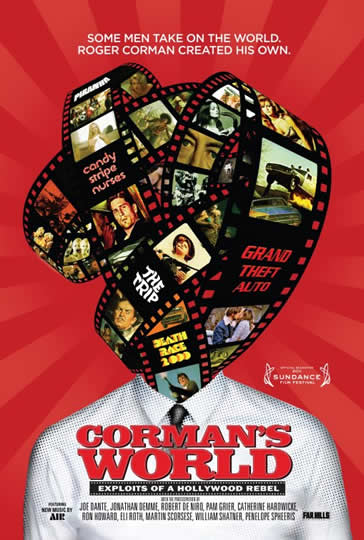Alex Stapleton’s directorial debut, Corman’s World: Exploits of a Hollywood Rebel, is a docu-tribute to legendary filmmaker Roger Corman. With an insatiable passion for her subject, Stapleton aims to get at the heart, soul, and raging psyche of Corman and his cinematic underworld. And while we get to know the what of Cormanʼs world—the films, the business, the legacy—it’s the who of Cormanʼs world that holds primacy.
Those who do not recognize the name Roger Corman have likely come to know him indirectly, as the Corman stamp is now all over the Hollywood milieu. As a director/producer/screenwriter and sometimes actor, he built a B movie empire from scratch, churning out over 400 low-budget flicks, some of which took less than a week to make. And he did it all with an extraordinary flair for commercial success, fostering the careers of cinematic talents who might have otherwise remained unknown, such as Jack Nicholson, Martin Scorsese, Ron Howard, Peter Fonda, Robert De Niro, Francis Ford Coppola, Jonathan Demme, and the list goes on…and on.
You might wonder what kind of guy makes films like Death Race 2000, Grand Theft Auto, Women in Cages, and Little Shop of Horrors. What Stapleton quickly discovers, is that Corman’s elusive, often contradictory nature defies category, just as he has defied big studio  Hollywood for over fifty years. It turns out, that venturing into Corman’s world is like unearthing a giant living puzzle. First of all, Corman is not the sleazy “schlockmeister” we expect. He is a distinguished, articulate man of ideas. He does confess, however, that despite his conventional appearance, his subconscious mind is a “boiling inferno.” As the interviewee, he remains gracious yet enigmatic, leaving Stapleton to create a richer fuller portraiture of Corman via his fellow filmmakers—a veritable who’s who of cinema. Interviews unfold in an informal manner at a barbershop, during a taxi ride, in living rooms, or along a neighborhood walk. This creates an intimacy and dynamism that is more conversational than journalistic. The conversational thread is one full of humor, quirky anecdotes, a tinge of bitterness here and there, but mostly a kind of reverence for the godfather of independent movie making.
Hollywood for over fifty years. It turns out, that venturing into Corman’s world is like unearthing a giant living puzzle. First of all, Corman is not the sleazy “schlockmeister” we expect. He is a distinguished, articulate man of ideas. He does confess, however, that despite his conventional appearance, his subconscious mind is a “boiling inferno.” As the interviewee, he remains gracious yet enigmatic, leaving Stapleton to create a richer fuller portraiture of Corman via his fellow filmmakers—a veritable who’s who of cinema. Interviews unfold in an informal manner at a barbershop, during a taxi ride, in living rooms, or along a neighborhood walk. This creates an intimacy and dynamism that is more conversational than journalistic. The conversational thread is one full of humor, quirky anecdotes, a tinge of bitterness here and there, but mostly a kind of reverence for the godfather of independent movie making.
The big picture that emerges is not so much of the man, but his mad energetic ethos. Corman never went to film school. As Stapleton puts it, “Roger was the king of the do-it-yourself technique; he learned how to make movies by making movies.” His approach was fast and furious—no permits, no regulations, no rules—just grit and grind. It is known as the Corman School of filmmaking. This guerilla style was often dangerous and certainly illegal. The Corman School served as a great big middle-finger to the impenetrable Hollywood establishment. What you get with Corman is not the low-fat, sugar-free, sanitized  projections of a happy consumer society. Instead, it is the darker unsightly things of the world—the unfolding of our own unconscious fears and fantasies. With an eye for unforgettable, gut-wrenching imagery, he is able to articulate that which is unspeakable; and the campy trashy aesthetic adds the “I could give a damn what you think” punch Corman fans crave. This might explain his consistent box office success.
projections of a happy consumer society. Instead, it is the darker unsightly things of the world—the unfolding of our own unconscious fears and fantasies. With an eye for unforgettable, gut-wrenching imagery, he is able to articulate that which is unspeakable; and the campy trashy aesthetic adds the “I could give a damn what you think” punch Corman fans crave. This might explain his consistent box office success.
A considerable outlier for the B movie master is The Intruder, his critically acclaimed and not so profitable film about desegregation. Based on a Charles Beaumont novel, William Shatner plays an impressively creepy out-of-towner who infiltrates a southern town on a zealous mission to stop integration. He wins favor by preying on the fears and prejudices of the locals until things get out of control. However, no one wanted to touch a film about integration in 1961, so Corman financed it himself. To create an atmosphere of authenticity, he filmed it in the Deep South, where the risky Corman ethos reached its peak, and fiction became reality as cast and crew were threatened by outraged locals.
It was the Corman ethos that moved Alex Stapleton to make this documentary. At 19, she read his book, How I Made a Hundred Movies in Hollywood and Never Lost a Dime. This became her training manual. She too never went to film school; she just threw herself full-on into the project, going deep into credit card debt until she eventually got the funding she needed. In this sense, the medium is the message. The result is a tasteful, intelligent, and inspiring work. Roger Corman’s gift to today’s artists rests in his love affair with risk, his faith in his people, and his capacity to thrive under the most turbulent conditions. The central question that repeatedly arises around Corman is, “Why doesn’t he just spend more money, and make better movies?” Perhaps, the better question is, why should he?
Corman’s World: Exploits of a Hollywood Rebel opened pre-Christmas 2011 in Los Angeles and New York. It is now playing in select theaters.
